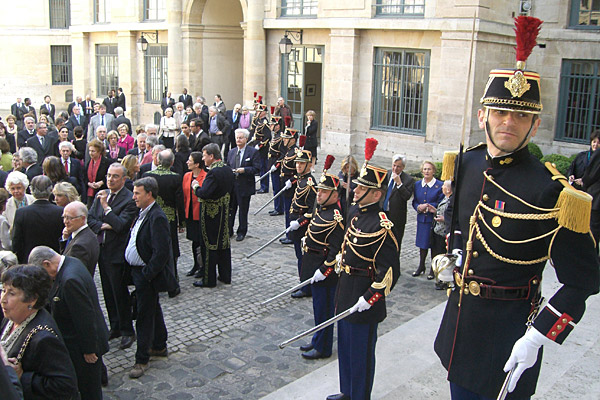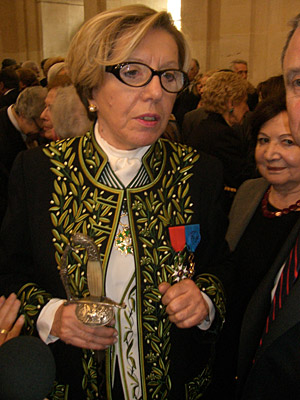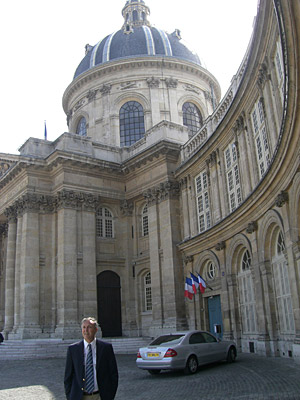L'Académie française
University professor attends induction at historic French literary institution
8 a.m., April 24, 2012--A University of Delaware professor witnessed an historical moment when he traveled to see an induction ceremony at one of the oldest literary institutions in the world.
During spring break, Bruno Thibault visited France to attend the induction of French writer Danièle Sallenave to l’Académie française, the French Academy.
Global Stories
Fulbright awards
Peace Corps plans
Established during the 17th century under King Louis XIV, l’Académie serves as the official authority of the French language, including its grammar and usage, and publishes the Dictionnaire de l’Académie française, the official dictionary of the French language.
Thibault, a professor of French in the Department of Foreign Languages and Literatures, was one of only 130 distinguished guests who attended the ceremony on March 29. He was personally invited to the ceremony by Sallenave and is considered the leading expert on her works.
Thibault said visiting l’Académie is a rare honor and once in a lifetime opportunity, and he was stunned by the duration and elaborate nature of the ceremony.
“It was like a childhood dream,” Thibault said.
There are 40 members of l’Académie known as immortals. Each one of them serves in his or her position for life. Notable members of the past include Voltaire, the renowned Enlightenment writer and philosopher, and Victor Hugo, author of Les Misérables and Notre-Dame de Paris (known in English as The Hunchback of Notre Dame).
Each year, the Académie française also awards some 60 prizes in various fields, including literature, painting, poetry, theatre, cinema, history, and translation. The most important prize is the Grand Prix de la Francophonie, instituted in 1986 and funded by the governments of France, Canada, Monaco, and Morocco.
Other important prizes include the Grand Prix de Littérature (for a literary work), the Grand Prix du Roman (for a novel), the Grand Prix de Poésie (for poetry), the Grand Prix de Philosophie (for a philosophical work), and the Grand Prix Gobert (for a work on French history).
The five-hour ceremony to induct Sallenave to l’Académie took place in the 17th century building that houses l’Académie, located across from the Louvre. There was a procession with the National Guard, and renowned writers and thinkers, political leaders and diplomats were also present to witness the event.
Though he was not present, French President Nicolas Sarkozy was also involved in Sallenave’s appointment to l’Académie. Since the founding of l’Académie in the 1600s, the head of state is responsible for confirming all appointments to this prestigious institution.
Thibault said the head of state would likely never overrule an appointment to l’Académie, but the practice stands to honor tradition. Other traditions also have lasted through the centuries, including the presentation of one-of-a-kind sword to the new inductees and the donning of uniforms originally designed in the time of Napoleon Bonaparte.
One tradition that died out, Thibault said, was the practice of not allowing women into l’Académie. Thibault said the group has become more open and diverse in recent years, and members are from multiple backgrounds. The current head of l’Académie, Helene Carrere d’Encausse, is a woman.
Sallenave succeeded a former head of l’Académie Maurice Druon, a novelist and former minister of cultural affairs in France. As part of tradition, Sallenave eulogized Druon and spoke about his life and achievements before a speech was given on her behalf by Dominique Fernandez, a well-known novelist and specialist of Italian art and history.
Thibault said the members selected Sallenave because in addition to her literary talents she is also an outspoken feminist and a political activist. He said this honor will undoubtedly promote her work and help her gain even more prominence.
“With the academy behind her she can be even more active than before in promoting culture and the humanities,” Thibault said.
Article by Lauren Pitruzzello













